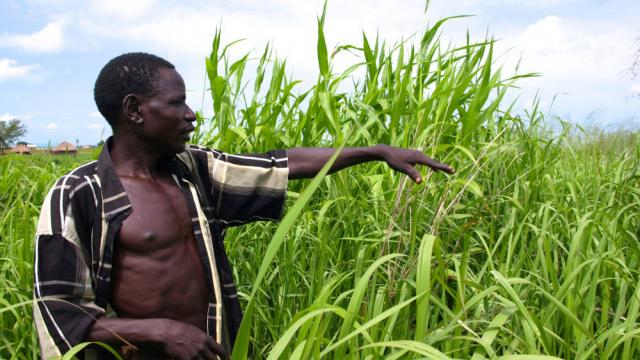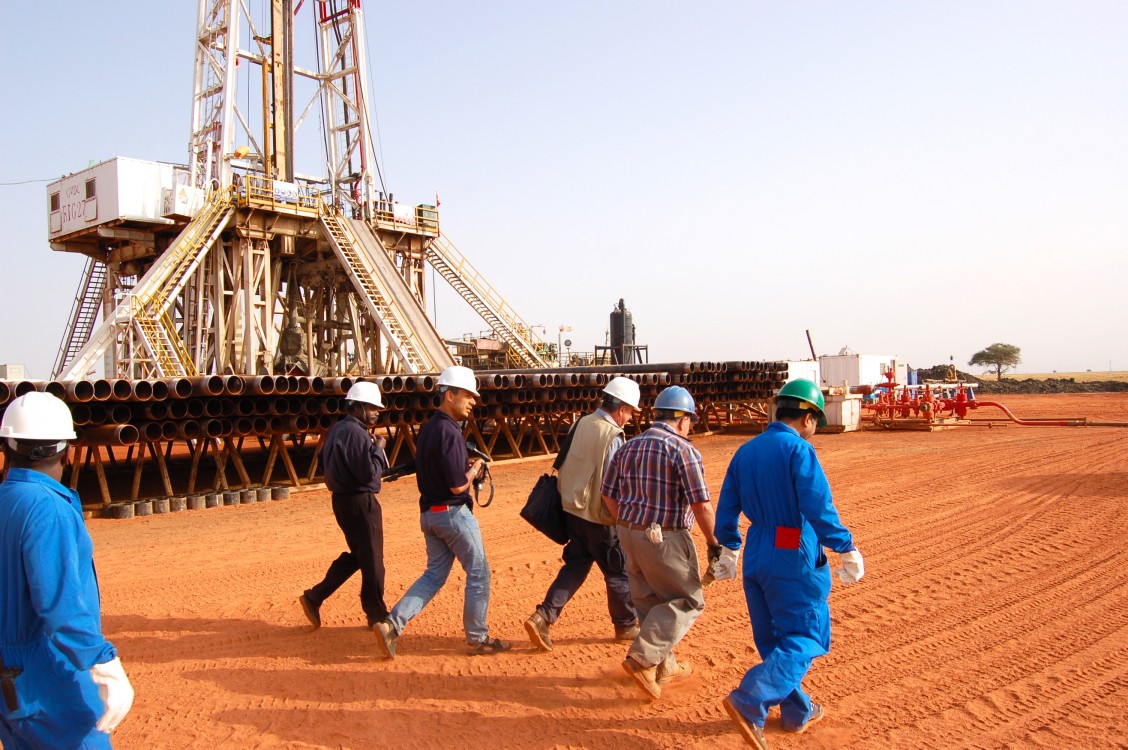
Profitable oil exploration in Uganda in 2006 threw the country into the global race for black, polluting gold. With instability in the Middle East, East Africa has received special attention of late from China and the U.S. in those countries' search for oil.
Today, three major oil companies hold permits to drill oil in Uganda: U.K.-based Tullow Oil, France’s Total, and China’s Cnooc. The first commercial oil is expected to start flowing here in 2018, and is estimated to last around 30 years. But even before the oil is on the market, it is causing tension - and gray hair - on the heads of many Ugandans and international observers.
Today, more than 80 percent of Ugandans are employed in the agricultural sector and only 15 percent of the population has access to electricity. The Ugandan government argues that oil revenues will lift the country out of poverty and fund schools, roads and other infrastructure projects. Others fear, meanwhile, that the people, the environment and the economy of Uganda will suffer more than gain from the oil.
So far, thousands of people have already been violently evicted from their homes to make room for the freshly booming oil industry, through a mix of government takeover and private land grabs for profit. As more explorations are ongoing and many of the country's politicians show more willingness to aid international investors than help their own citizens, it is likely that more people will be removed from their lands in the future.
Recently, Ugandan President Yoweri Museveni said in a public comment to people living on land that contains minerals: “The mistake has been to make the investors deal with the landowners. They should deal with the government; and then the government will deal with the landowners. You just tell those villagers to get out. You cannot stop the State from accessing its assets.”
But it is not only people who have been displaced. As oil companies have been allowed to operate inside the national parks, it has led to changes in wildlife behavior as well. Increased oil explorations have scared many animals away from their habitats; they now have less space to roam, endangering their existence. And the commercial drilling has not even started yet.
At the same time, pipelines, chimneys and oil trucks driving side-by-side with the safari jeeps are unlikely to enhance the experience of seeing wild, untouched nature, which today is attracting scores of well-paying tourists from all over the world to Uganda. The environmental degradation caused by oil exploration threatens not only tourism, which represents a serious income for Uganda, but the local people living adjacent to the parks.
The Dutch Disease
Examples from other oil producing countries have shown that as soon as the oil starts to flow, it begins to undermine other parts of the economy. This tendency is called the Dutch Disease.
The study, “Acceleration Growth and Maintaining Intergenerational Equity Using Oil Resources in Uganda,” from the Economic Policy Research Center, warns that Uganda is likely to experience this "disease" in full if the country's politicians don't quickly change course. The study states: “If managed opportunistically, the result could be not just to deal effectively and fully with poverty, but deterioration of economic, social and political conditions.”
Where many people employed in the oil industry are certain to get rich, most outside the industry will not. On the contrary.
One example is Nigeria, which today is one of the biggest oil exporters in the world. Nigeria used to be a big exporter of agricultural products, and was self-sufficient in almost all food products. As oil attracted public and private investment, education, workforce, infrastructure and governmental attention in the rural districts were ignored, and agriculture declined.
Today Nigeria spends an estimated $11 billion on importing food, and the poorest areas of the country have little or no funding for infrastructure projects, as opposed to the pre-oil era when agriculture was taken seriously.
Another example is Zambia, where the corporate copper industry has drained all the best financial and administrative minds from other sectors. The tax authorities here have been left without enough capable staff to raise lawful taxes; as a result, it's only too easy for the mining industry to avoid paying taxes by transferring its official transactions to tax heavens overseas. Despite its massive copper resources, Zambia is one of the poorest countries in the world.
At the same time, both Zambia and Nigeria have been struggling with high levels of corruption and bad governance. In both countries, politicians have been busy enriching themselves instead of putting resource income to good use developing the country and pulling people out of poverty.
Loan for Oil Infrastructure
Back in Uganda, construction of oil refineries, waste treatment plants, pipelines, roads and other infrastructure projects are already prioritized over other areas. Much of the country has inadequate roads, which translates into little or no access to schools, hospitals or markets where people can sell their products.
Yet now, with a loan of $150 million from the World Bank, the Ugandan government is planning to construct roads to service the oil companies, provide scholarships for potential oil workers, and fund an oil institute that will allegedly benefit people of the oil rich Albertine region in the west of the country. However, even if it becomes the case that the people in Albertine benefit, most other Ugandans aren't seeing anything near those investments in their areas.
Despite history having proved the opposite, the Ugandan government and the global oil industry it's courting argue that oil money will drip down to other sectors, such as agriculture, and eventually aid the poorest parts of the population. The argument is dismissed by many, including Dr. Frederick Kisekka-Ntale, a researcher of human and state resources at the Makerere Institute of Social Research in Kampala.
“Thinking that oil money will lead to a ripple of so much money going to the agricultural sector is hollow because investors will put their money where there are maximum profits,” he told the Daily Monitor. He likewise referred to Uganda's lack of other infrastructure halting much in the way of potential agriculture.
“We should look at the comparative advantage we have in agriculture. The support should be targeted and state centered. [The] private sector would only boost agriculture if the state has put a great proportion of investment and the rate of risk has been reduced by removing the bottlenecks that would have caused a fall in profits," he said.
A White Elephant
One of the fears aired in public here is that often countries with sudden inflows of oil money tend to invest the funds in white elephant projects, such as stadiums and other prestige constructions, at the expense of the people. Another concern is that when the money starts flowing from the oil, prices of most other commodities will begin to rise and cause inflation. According to Trading Economics, since 1998 Uganda has had an average inflation of 7.1 percent. At one point it was more than 30 percent.
The Ugandan government has announced it plans to channel oil revenues into specific projects to avoid injecting cash directly into the economy and provoking this kind of instant inflation. But if hyper-inflation should strike, it could potentially eat up the income from oil and have catastrophic consequences for the Ugandan economy.
Unsurprisingly, the big three oil companies have already lobbied for low tax rates and have threatened to withdraw investment if their low-tax demands aren't met. This is standard rhetoric for natural resource extractors the world over.
Uganda's tax authorities, on the other hand, could be innovative and reflect competence dealing with the international oil and mineral corporations, who are masters in the art of paying as little tax as possible – but whose leash needn't be so long. In a country with very limited governmental capacity and high levels of public corruption, levying taxes on the oil companies might prove a difficult task for Uganda – the the only realistic option, in the end, that the country has.
3 WAYS TO SHOW YOUR SUPPORT
- Log in to post comments












